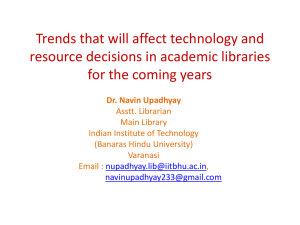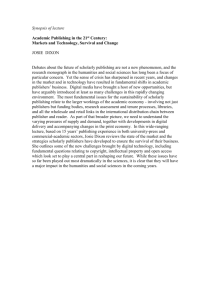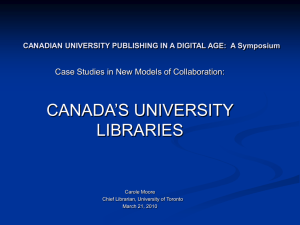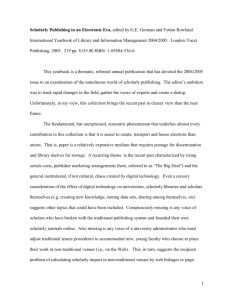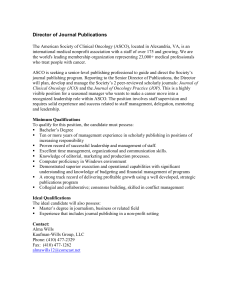Sustainable research dissemination
advertisement
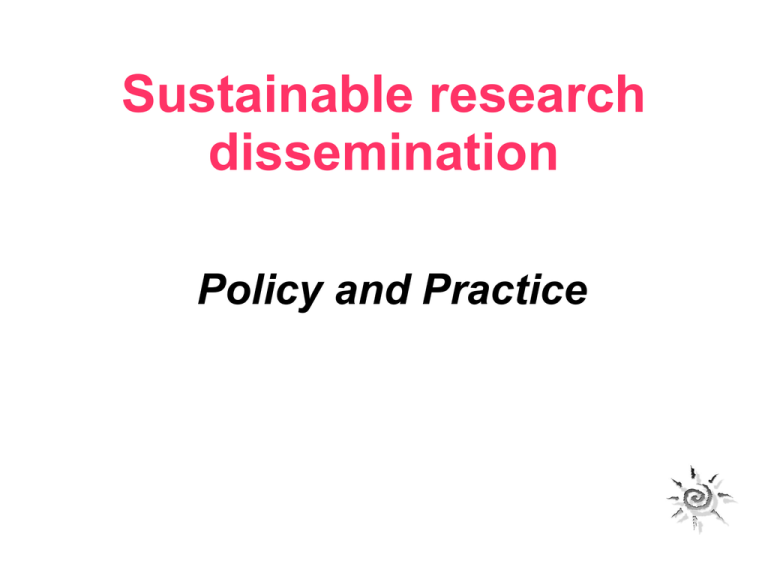
Sustainable research dissemination Policy and Practice The problem the marginalisation of African knowledge For our continent to take its rightful place in the history of humanity ... we need to undertake, with a degree of urgency, a process of reclamation and assertion. We must contest the colonial denial of our history and we must initiate our own conversations and dialogues about our past. We need our own historians and our own scholars to interpret the history of our continent. President Thabo Mbeki – launching the Timbuktu Library Project Can research publication in Africa be sustainable? World Bank now arguing that higher education could be an essential driver of economic growth in Africa NEPAD is calling for proposals for the creation of an African Science and Innovation Facility Higher Education Policy built around the idea of Innovation and driven by the concept of the knowledge economy in a networked society SA research needs to be responsive The universities need to assert the importance of their independence, and the value of the knowledge commons as a seedbed of innovation ranging from product development to the design of effective public policies…they need to show how their work is responsive to the pressing needs of development Martin Hall, Freeing the Knowledge Resources of Public Universities. KM Africa conference, DBSA, March 2005 The importance of research dissemination Public and merit goods are those which the public values but which the markets find it difficult to allocate because individuals cannot, or should not, be excluded from their consumption. Scientific research falls into this category and society as a whole is worse off if access to scientific results is restricted. Costs and Business Models for Scientific Publishing Welcome Trust. Created by SQW – A report commissioned by the When it comes to research publication policy, we hit a brick wall Promotional and reward policies at national and university level are based on publication in journals in international indices. If one examines the criteria that determine the selection of journals into the ISI and the IBSS, it is clear that they are heavily weighted against developing countries and the disciplines that depend on local knowledge Given our marginalisation, we need to learn to expand our minds and not get trapped in preconceptions of how our environment is shaped Rather ask questions about what we need to achieve – for the country, the university, the discipline, our own careers Conventional scholarly publishing in the developed world Where is it at? 'We have a scientific publishing system that is massively dysfunctional and really, really broken.' James Boyle, William Neal Reynolds Professor of Law, Duke University, at the iCommons Summit, Rio, June 2006 The patient is dying! Call the ambulance! Lindsay Waters, Humanities editor, Harvard University Press What are the problems? Commercialisation of journal production – control in the hands of large near-monopoly conglomerates Double-digit price increases in a captive market Profit strategies of publishers at odds with public interest of scholars Publish or perish policies driving up book production Library budgets down Publish and perish Publish or perish policies have debased the value of the scholarly book and led to a proliferation of poor-quality journals across the world. In the face of falling budgets and buy-in into commercial models, university presses driven to 'break even' or make profits. Result – the convergence of scholarly publishing with upper-end trade publishing Peculiar assumptions Publishing should be outsourced Scholarly publishing is a profit-based business Research dissemination is not the business of universities and research institutions and they do not need to fund it These assumptions become even more peculiar when applied in a developing country context Academic publishers face dangers from all sides these days - the public, taxpayers, profs, students, librarians, colleagues. There has emerged the idea among administrators and some academic publishers themselves, who seem to feel compelled to comply with unreasonable expectations, that university presses should be turned into ‘profit centres’ and contribute to the general budget of the university. Where did this idea come from? It’s bad. We have financial records of publishing in the West since Gutenberg, and it is clear that books are a losing proposition. Widgets have been, and always will be, a surer bet. And the idea of milking the university presses – the poorest of all publishers – for cash is the equivalent of making the church mice contribute to the upkeep of the church. Lindsay Waters, Enemies of Promise: publishing, perishing, and the eclipse of scholarship. Chicago, 2004. Prickly Paradigm Press Conventional scholarly publishing from our end of the telescope Research agendas The emphasis on mainstream journals in international indices skews research priorities – critical research areas of importance to the developing world can be marginalised Local researchers target international priorities for reasons of prestige and promotion Restricted access to international research findings can block development needs Local- interest research gets second-rate status The marginality of African knowledge is evident even in the Africanist intellectual system, which is firmly rooted in a western epistemological order and an academic culture driven by a ruthless ethos of ‘publish and perish’ and consisting of multinational publishing houses, university presses, peer review networks, citation and bibliographical conventions, and has little room to accommodate the alien views, voices, and visions emanating from Africa itself. In this scholarly treadmill, Africa appears nothing more than a research object to verify faddish theories that emerge with predictable regularity in the channelsurfing intellectualism of Northern academics. And so we get the strange spectacle of books and articles being churned out containing no reference to the scholarship produced in the countries and regions concerned, …It is work that often contains the latest bibliographic references to Africanist research and rather dated facts, while the work of African scholars may contain dated bibliographical references and the latest facts. Paul Zeleza, Bergen, 1997 Looking forward Policy-makers need to be able to discern, based on their expert knowledge, the future trajectories of the subject and the interventions which might improve its development. NEPAD 2006 Do new Internet-based dissemination models provide an answer? The Budapest Initiative An old tradition and a new technology have converged to make possible an unprecedented public good. The old tradition is the willingness of scientists and scholars to publish the fruits of their research in scholarly journals without payment, for the sake of inquiry and knowledge. The new technology is the internet. The public good they make possible is the world-wide electronic distribution of the peerreviewed journal literature and completely free and unrestricted access to it by all scientists, scholars, teachers, students, and other curious minds. Removing access barriers to this literature will accelerate research, enrich education, share the learning of the rich with the poor and the poor with the rich, make this literature as useful as it can be, and lay the foundation for uniting humanity in a common intellectual Internet publishing Reduces the marginal cost of publishing (i.e. the cost of making more copies) Distribution costs near-zero Greater reach - geographical barriers no longer relevant Peer to peer networks allow for collaborative and interactive research development Without the expense of print distribution, new financial and business models are possible Different products Internet publishing creates opportunities to rethink the range of products that can be produced. Faster publication is also possible: Journal articles – do they have to be held back for a journal issue? Research data can be provided along with research findings Research repositories – can promote institutional profiles Research reports and popularisations – handbooks, magazines, blogs... Different approaches • Research habits may become less isolated • Authoring may acquire more diffuse agency • Teaching habits may become less individualistic • Publishing may be more of a collective enterprise Saul Fisher, The Open Source Movement and Higher Education: Consequences for the Humanities New business models - Open Access The focus is on access, with the content distributed online, free of charge Copyright remains with the author Costs still have to be borne somewhere, either by the author (or research funder), through government support, donor funding or advertising Can be used freely for research, teaching, etc. Retains peer review, editing and other quality measures International initiatives South Africa is a signatory to the OECD declaration on access to research data from public funding (2004) There are now a number of international declarations – Budapest, Berlin, Bethesda, Salvador... Governments and agencies have addressed the issues and endorsed OA in varying degrees: the UK government, the EU, WSIS, the NIH in the USA, Wellcome Trust... Policy positions EU has just issued a report – asks for a guarantee of public access shortly after publication; a levelling of the playing field, rocompetitive pricing strategies... Wellcome Trust requires OA to the research that it funds, with deposit required within 6 months The NIH in the USA requests OA archiving The RCUK asks that funded researchers deposit a copy in an archive And the Bill Gates Foundation will only fund Open Access Aids vaccine research If Open Access increases the reach and impact of dissemination and massively increases citation, then how do we go about getting support to make it sustainable in Africa? The University of California A case study The Library Scholarly Communications Programme Influencing the development of new forms of scholarly communication is a key strategic goal Implementing a programme for sustainable communications and widest possible access Discussions involve faculty, librarians, administrators and the university press Scholarly Communication faculty seminars were held Faculty come to understand their role as primary stakeholders Managing copyright Toolkit for faculty Talking points for discussion Information handouts and brochures Policy White Paper Taking back control of copyright Guidelines for management of copyright Guidelines for institutional repositories A decision to change the status quo Driven from the top - the Office of the President serves as a think-tank The trigger – could not maintain the serials budget in the library There is an Academic Council Committee on Scholarly Communication System-wide Library and Scholarly information Advisory Committee Office of Scholarly Communication Staff Director of Publishing and Strategic Initiatives – establishes alternative publishing venues and surfaces innovative technology use Director of Policy, Planning and Outreach – helps ensure that the community is informed of the crisis and serves as Communications Officer Publishing Support Services Manager Scholarship Web Design and Services Manager E-Scholarship Publishing Initiatives Run by the Office of Scholarly Communication and housed at the California Digital Library Includes e-Scholarship editions (2 000digital texts and editions of monographs, including 1400 university press titles) available to faculty and students and some titles to the public E-scholarship repository supports the full range of scholarly output, from pre-publication materials to journals and peer-reviewed series, by offering departments control of their publications A range of players – effective interaction The libraries analyse costs,work with faculty to align costs,and with the university press on experiments in scholarly publishing, and assembling information Administration is rethinking policies; library committee sharing data on the economics of scholarly publishing Council analysing scholarly publishing issues Senate called for cutting ties with Elsevier International Policy Fellowship OSI Budapest http://www.policy.hu http://blogs.uct.ac.za/blog/gray_area s Eve Gray & Associates http://www.evegray.co.za
